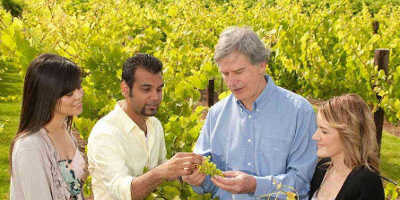How to Speak Wine
Written by: Cameron Ward
Published: 11/01/2019
Reading time: 3 mins
The world of wine is big and confusing. Try and read a review or recommendation and chances are half of what they’re saying will go right over your head!
The Barossa Valley is heralded for its great red wines, but why? The world of wine practically has its own language singing the praises of the Barossa’s reds. It can be hard for new wine lovers to develop an understanding of what makes the wines so good when companies are using all these fancy words. We’ve broken it down for you, so grab a glass of red, sit back, and get ready to blow your friends minds away with your wine knowledge.
-
Tannin
Tannins are a compound that naturally occur within grape skin, seeds and stems -wine science wahoo! Tannins are released when grapes are pressed and soaking in their own juices. Since red wines are typically fermented with seeds and skins, they have higher tannins than white wines. Chances are that you’ve already drunk wine with tannins before. The dry feeling in your mouth that some wines cause is the result of higher tannin levels. Tannins are a natural antioxidant and are good for humans, however high doses can cause headaches for some people!
-
Oak
Though not all wines are oaked. However, the fifty most expensive wines in the world are, and it is commonly accepted that oaking produces higher quality wines. Many fine wines are aged in oak barrels and it is an important step in the wine making process. Oak barrels impart aromas onto the wine and can change the flavour profile of the final drink. Though many new age wineries are starting to ferment and age in oak alternatives, oak remains as the preference for fine wines, including many you will find in the Barossa Valley.
-
Decant
Decanting is the act of airing wine to improve taste. Not all wines should be decanted, however nearly all reds you’ll find in the Barossa benefit from it. Decanting wine gives it time to breath and ultimately will improve the taste of red wine. Try a glass of decanted and not decanted wine next to each other. The decanted wine will taste fruitier and smoother. Head to a cellar door and ask about the best decanting methods for their reds.
-
Terroir
Terroir refers to the ways in which a regions climate, soil and terrane can impact the taste of wine. The mineral makeup of soil can change the taste of grapes, reducing or increasing acidity. Altitude also has a significant impact on the ways in which grapes grow. The Barossa Valley has two officially recognised sub-regions, with a whole range of soil types. The Barossa Grounds project has been working since 2008 to identify the soil types across the valley and identify the impact soil can have on the grapes. Next time you’re visiting a winery ask them about the soil they grow their grapes in!
Now you’ve got a few key terms under your belt, go and show off your new wine knowledge on one of our Barossa Valley winery tours!
Related article: The Wines of the Barossa Valley




